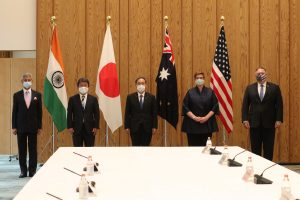The foreign ministers of Australia, India, Japan, and the United States met in Tokyo on October 6 for a highly anticipated “Quad” ministerial meeting. While they had met once before as a grouping, in September last year on the sidelines of the United Nations General Assembly in New York, this edition assumes particular significance, having taken place amid regional and global disarray on account of the COVID-19 pandemic. Just as the Indo-Pacific and the world were adjusting to changed geopolitical circumstances due to China’s noisy rise, the pandemic has added additional geoeconomic questions, principally around supply chain resilience, to the mix of regional difficulties. Predictably, the broadly similar meeting readouts from all four emphasized challenges emanating from the pandemic.
The following seven differences, however, stood out:
- Only the United States and Australia mentioned the need for the Quad to work toward countering disinformation.
- Australia’s statement alone mentioned the need for regional powers to conform to the United Nations Convention for the Law of the Sea. It was also the only statement that made an explicit reference to rules and norms in the region.
- Japan explicitly named North Korea and the East and South China Seas as regional affairs that were discussed. The United States’ readout noted that the ministers “reviewed recent strategic developments across the Indo-Pacific.” The Indian readout too mentioned that “regional issues of mutual interest” were discussed. In omitting a similar reference, Australia was the odd one out in this regard.
- India’s readout did not mention the need for the Quad to pursue cooperation around quality infrastructure. This is not surprising given that India is not part of the Trilateral Partnership for Infrastructure Investment established by the other three in 2018.
- Japan’s statement alone noted the positive role of extra-regional powers (in its case, European countries) in maintaining a Free and Open Indo-Pacific.
- The Indian and Australian readouts explicitly mentioned cooperation around access to COVID-19 vaccines. Japan’s made an indirect reference, by way of Quad “cooperation in the areas of health and hygiene.” Perhaps it doesn’t come as particular surprise that United States’ readout omitted any similar reference.
- India’s readout was the only one that omitted any reference to cybersecurity and data issues.
The State Department also published the opening remarks of U.S. Secretary of State Mike Pompeo, Australian Minister of Foreign Affairs Marise Payne, and Indian Minister of External Affairs S. Jaishankar at the Tokyo meeting. Compared to Jaiskankar and Payne’s statements, Pompeo sounded combative toward China, noting that “We couldn’t have imagined the pandemic that came from Wuhan,” going on to add “[t]hat crisis was made infinitely worse by the Chinese Communist Party’s coverup.”
In an interview to Nikkei Asian Review earlier on October 6, Pompeo suggested that the Quad should be institutionalized, following which “we [Quad members] can begin to build out a true security framework” for the Indo-Pacific. He also described the Quad as the “fabric” that could “counter the challenge that the Chinese Communist Party presents to all of us.”
It is unclear what the others make of the U.S. secretary of state’s remarks.
































